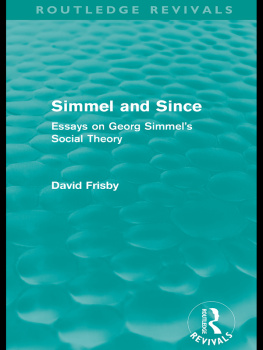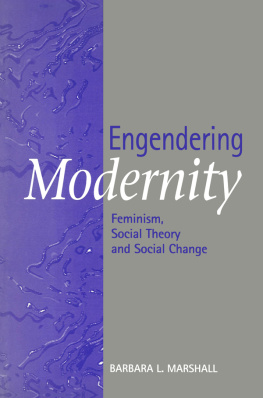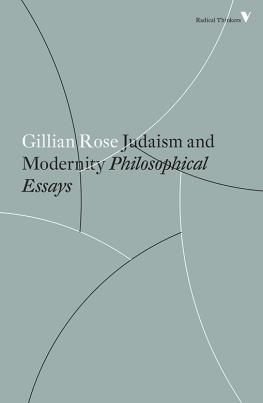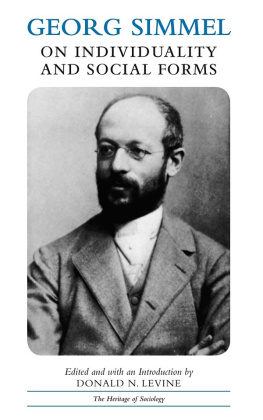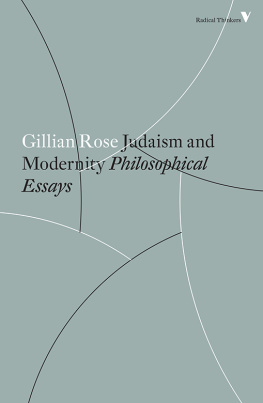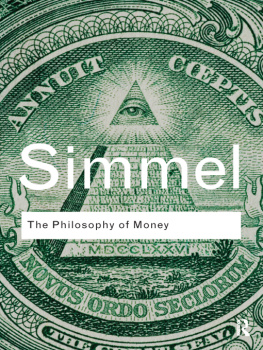Simmel and Since
Few contemporaries of Simmel enjoyed a readership larger than his. In the intellectual circles of Berlin at the turn of the century his dazzling and inimitable essays and books on metropolitan life were a cause clbre in intellectual circles. His eclipse after his death in 1918 is therefore one of the most remarkable circumstances of sociology in the twentieth century. In part it is to be explained by his style of analysis which few disciples could measure up to. But Simmel has also suffered from the serious error of labelling him as a formal sociologist. It is a rich irony that one of the most subtle and many-sided of sociological thinkers should have suffered this fate. The 1980s has witnessed a steady growth of interest in Simmel. This is due in no small measure to the work of David Frisby. Through a series of translations, essays and books, Frisby has played a significant role in reclaiming Simmel as a key sociologist of the modern tradition.
This new book ranges from accounts of Simmels key concepts such as that of society and his neglected contribution to social psychology. It includes chapters on Simmels work on the metropolis, social space, leisure, aesthetics and modernity. The final chapter considers the relevance of Simmel for present day debates on culture, aesthetics and postmodernity. Scholarly and shrewd, the book will be of interest to students of Sociology and Cultural Studies.
David Frisby is Professor of Sociology at the University of Glasgow.
Simmel and Since
Essays on Georg Simmels Social Theory
David Frisby

London and New York
First published in 1992
by Routledge
11 New Fetter Lane, London EC4P 4EE
This edition published in the Taylor & Francis e-Library, 2010.
To purchase your own copy of this or any of Taylor & Francis or Routledges collection of thousands of eBooks please go to www.eBookstore.tandf.co.uk.
Simultaneously published in the USA and Canada
by Routledge
a division of Routledge, Chapman and Hall Inc.
29 West 35th Street, New York, NY 10001
1992 David Frisby
All rights reserved. No part of this book may be reprinted or reproduced or
utilized in any form or by any electronic, mechanical, or other means, now
known or hereafter invented, including photocopying and recording, or in any
information storage or retrieval system, without permission in writing from
the publishers.
British Library Cataloguing in Publication Data
Frisby, David
Simmel and since: essays on Georg Simmels social theory.
1. Sociology. Simmel Georg 18581918
I. Title
301.092
Library of Congress Cataloging in Publication Data
Frisby, David.
Simmel and since: essays on Simmels social theory.
p.cm.
Includes bibliographical references and index.
1. Simmel, Georg, 18581918. 2. SociologyGermanyHistory.
3. SociologyMethodologyHistory. I. Title.
HM22.G3S4828 1992
301.01dc20 9115069
CIP
ISBN 0-203-83274-4 Master e-book ISBN
ISBN 0-415-00975-8
ISBN 0-415-07275-1 (pbk)
Contents
Acknowledgements
I wish to thank the following for permission to reproduce, where appropriate, in a revised form the essays collected in this volume: appears here for the first time.
Thanks are also due to the Nuffield Foundation for a grant which enabled me to research some of these contributions at Konstanz University in 1987. More recently, a small grant from the German Academic Exchange Service facilitated a further study at Konstanz in the summer of 1990. I am therefore grateful to the DAAD (German Academic Exchange Service) and, as ever, to the Fachgruppe Soziologie, Konstanz University, and especially to Horst Baier, for their hospitality.
Finally, I wish to thank Ann Adamson and Pip Townsend for typing the final manuscript.
David Frisby
Glasgow
Introduction
The essays on Georg Simmels social theory assembled here are the result of a decades preoccupation with his work. This commenced with the joint translation (with Tom Bottomore) of Simmels The Philosophy of Money (first published 1978). It continued with monographs in which Simmels work stands at the centre, notably Sociological Impressionism (first published 1981) and Georg Simmel (first published 1984). Simmels work on modernity also forms a significant component of my Fragments of Modernity (first published 1986). Reflections on Simmels social theory also play a more minor role in Society (1986, with Derek Sayer). Alongside a number of interpretive essays, most of which are reprinted here in revised form, my concern with Simmels social theory has been enhanced by participation in the critical German edition of his works (under the general editorship of Otthein Rammstedt) which will eventually comprise twenty-four volumes. This has resulted in my editing (with Klaus C.Khnke) the critical edition of Philosophie des Geldes (1989) and (with H.-Jrgen Dahme) of Aufstze und Abhandlungen: 18941900 (1992). In addition, a volume of materials for the contextualisation and interpretation of the former work (again with Klaus C. Khnke) will appear as Materialien zur Philosophie des Geldes (1992).
What is offered in the present volume is a presentation and reworking of themes that have been my concern in the process of becoming acquainted with some, but by no means all, of Simmels many works. The main focus of the essays offered here is upon social theory butas one would expect of interpretations of the works of such a wide-ranging author as Simmela social theory that extends into many other areas.
The essays are assembled in three sections of unequal length. In the first section, two essays examine some general aspects of Simmels sociology, namely the diversity of his conceptions of society and his treatment of individual interaction in and as society, as well as an indication of his contribution to social psychology. The main body of essays is contained in the second section and examines various dimensions of Simmels contribution to a social theory of modernity. This section commences with an attempt to locate his contribution to this topic in the context of his German contemporaries, notably Tnnies and Weber. It is followed by an overview of significant features of Simmels theory of modernity, the details of which are presented more fully and substantively in my Fragments of Modernity. Two succeeding essays take up aspects of the two sites of modernitythe mature money economy and the metropolisin the hope of revealing neglected dimensions of both. The last two essays in this section examine, respectively, Simmels contribution to a sociology of leisure (again drawing upon experience of metropolitan existence) and to a social aesthetics of modern everyday life. The final section seeks to examine once more Simmels contribution to a social theory of modernity and, perhaps more problematically, to a theory of postmodernity. It also highlights, in this context, what proved to be an important project amongst critical social theorists, namely, the development of reflections upon the culture of things. More generally, the last section contains some remarks on the fate of Simmels social theory since his death in 1918.
In assembling these essays for publication, it is apparent how little of Simmels corpus of work is actually covered in them. The reader must refer to other works on Simmel for an examination of the many themes not dealt with here. It is indeed difficult to do justice to an author who displays such a variety of rich analyses and insights in a whole range of areas. The present volume is a small contribution to that task. The interpretation of Simmels work which it contains is therefore one that extends my earlier explorations. Apart from the first two chapters, on foundational aspects of Simmels sociology, the remainder of the text is largely concerned with his contributions to the study of modernity and possibly postmodernity. The interpretive thrust of these chapters centres around

